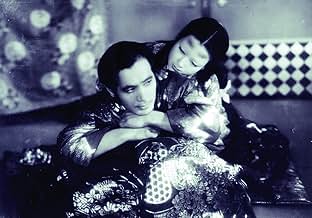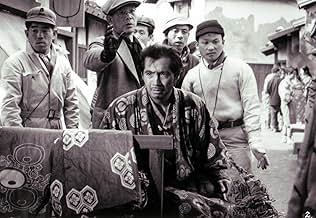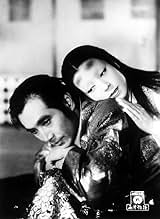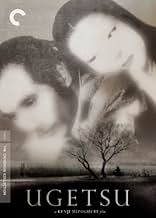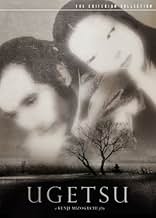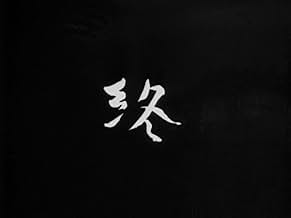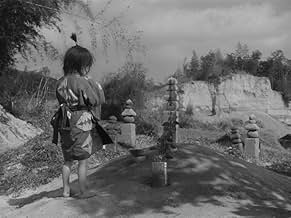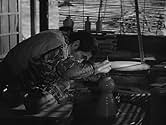VALUTAZIONE IMDb
8,1/10
27.494
LA TUA VALUTAZIONE
Una storia di ambizione, famiglia, amore e guerra ambientata nel bel mezzo delle guerre civili giapponesi del sedicesimo secolo.Una storia di ambizione, famiglia, amore e guerra ambientata nel bel mezzo delle guerre civili giapponesi del sedicesimo secolo.Una storia di ambizione, famiglia, amore e guerra ambientata nel bel mezzo delle guerre civili giapponesi del sedicesimo secolo.
- Regia
- Sceneggiatura
- Star
- Candidato a 1 Oscar
- 6 vittorie e 2 candidature totali
Eitarô Ozawa
- Tôbei
- (as Sakae Ozawa)
Recensioni in evidenza
10lwalsh
Having read much about this film, I thought I knew what to expect when I finally had the chance to see it. I was wrong; no amount of writing can convey the richness and impact of the images and the overall flow of the film-- which is why this commentary will be brief. Suffice it to say that I recommend this film wholeheartedly to anyone looking for cinematic poetry (though not, probably, to those who, misled by its being set during the Japanese Civil Wars, expect an action film).
Perhaps the most striking thing about the film is the camera-work; on a first viewing one is scarcely aware of it much of the time, but the camera is in constant motion, emblematic of the restlessness which pervades not only the era and the central characters but, by implication, all of human life (in this regard, it's a very Buddhist film). This movement is never gratuitous; when the scene demands little or no movement the camera stays still. Notice, though, how often the camera's movement enhances the emotional impact of the scene, especially in the famous panning shot (not, as occasionally described, a 360 degree shot) of the reunion near the end. Along with this is Mizoguchi's penchant for long takes, which seduce the viewer into the rhythm of the film without calling attention to themselves or to his cleverness as a director.
But these are technical comments which may or may not be helpful in focussing a viewer's attention; what really matters is the film itself as a whole. It is truly beautiful, and powerful in the unexpected way of great poetry. Technique and emotion, simplicity of means and complexity of effects, walk hand-in-hand here, and the result is remarkable in a way which film rarely attains.
Perhaps the most striking thing about the film is the camera-work; on a first viewing one is scarcely aware of it much of the time, but the camera is in constant motion, emblematic of the restlessness which pervades not only the era and the central characters but, by implication, all of human life (in this regard, it's a very Buddhist film). This movement is never gratuitous; when the scene demands little or no movement the camera stays still. Notice, though, how often the camera's movement enhances the emotional impact of the scene, especially in the famous panning shot (not, as occasionally described, a 360 degree shot) of the reunion near the end. Along with this is Mizoguchi's penchant for long takes, which seduce the viewer into the rhythm of the film without calling attention to themselves or to his cleverness as a director.
But these are technical comments which may or may not be helpful in focussing a viewer's attention; what really matters is the film itself as a whole. It is truly beautiful, and powerful in the unexpected way of great poetry. Technique and emotion, simplicity of means and complexity of effects, walk hand-in-hand here, and the result is remarkable in a way which film rarely attains.
The movie starts out pretty uncomfortably, two peasants in 16th century Japan who dream of richness and glory so blindly, they can't even hear the pretty straight-forward protests of their loving wives who try to convince them that their happiness is fine at home. When one, a pottery smith, makes a small bundle selling his wares, they decide to make a much larger batch together and become rich.
Forced out of their homes by an approaching war and uncertain where to go, they take their wares to a thriving market place, where the second peasant's ambition to be a samurai divides them and causes all four characters, the two peasants and their wives, to be separated, all fending for themselves amongst the war and various classes differently.
At this point the film reverses itself and instead of being a pretty skin-deep, tragic bud of greed, it blooms into a beautiful and haunting tale of obsession and illusion. The two main stories of the peasants and their wives are opposite only in their imaged realism, where one peasant falls completely under the curse of an enchanting ghost and the other lies and steals his way to fame, only both of them are eventually knocked down from their own hubris and forced to finally awaken to what their wives have said all along.
It's quite exquisite, this movie, with its long takes and its lack of the usual constructs that make up messages of obsession and greed. Once it gets beyond the small, uncomfortable, claustrophobic world of the peasant's home, it becomes audaciously challenging and mysterious, so that the same small home becomes amazingly wonderful and comforting. The very essence of the movie is breathed into the emotions of the audience in very subtle ways, making a very unforgettable cinematic experience.
--PolarisDiB
Forced out of their homes by an approaching war and uncertain where to go, they take their wares to a thriving market place, where the second peasant's ambition to be a samurai divides them and causes all four characters, the two peasants and their wives, to be separated, all fending for themselves amongst the war and various classes differently.
At this point the film reverses itself and instead of being a pretty skin-deep, tragic bud of greed, it blooms into a beautiful and haunting tale of obsession and illusion. The two main stories of the peasants and their wives are opposite only in their imaged realism, where one peasant falls completely under the curse of an enchanting ghost and the other lies and steals his way to fame, only both of them are eventually knocked down from their own hubris and forced to finally awaken to what their wives have said all along.
It's quite exquisite, this movie, with its long takes and its lack of the usual constructs that make up messages of obsession and greed. Once it gets beyond the small, uncomfortable, claustrophobic world of the peasant's home, it becomes audaciously challenging and mysterious, so that the same small home becomes amazingly wonderful and comforting. The very essence of the movie is breathed into the emotions of the audience in very subtle ways, making a very unforgettable cinematic experience.
--PolarisDiB
Ugetsu is a film that separates itself from both period pieces of its time and from Japanese film of any era. It neither has the ferocious, exiting energy that Kurosawa successfully utilized, nor the slow mundane nature that Ozu became known for. Rather it attempts (successfully) to give a drawn out, slightly surrealistic atmosphere that exhibits images of lingering beauty throughout its short length. What drew me into the film deepest was the usage of not style or substance (if that makes sense), but rather these images that remained on your mind long after the film was finished. A sabotaged boat drifting away in the fog with nothing but a dead man aboard, an enchantress' seduction of a naive peasant and a landscape dotted with danger and war, all make up some of the most beautiful images, that would not be out of place in a painting. They alone say more then most films do in their entire message.
The film nonetheless has some very impressive subject matter to its credit, dealing with war, greed and the line between reality and the spiritual world. Throughout the film we see two peasants progressively grow to lust for the riches of the world, Genjurô desires to sell his wares and become wealthy, while Tobei desires to be a samurai and have power. In time they both get to a point where this is a reality, where one of them fulfills what he desires, the other is led into a surrealistic haze by a demonic seductress. In the end the loss of what was important all along becomes apparent, and a message of humility becomes the films point.
Though it is not nearly as accessible a film as Kurosawa's period pieces of the same time, Ugetsu succeeds on a level that they do not. It brings an element of sheer beauty I have not been acquainted with by any Japanese director. The camera moves much slower as to give you a sense of your surroundings, to allow the film to become part of you. In doing this Mizoguchi distances some viewers, while at the same time bringing many to a level impossible with any other director (Eastern or Western). He successfully does what all great artists do, he makes his art truly great and therefore truly subjective.
There is not a lot I can further say about this beautiful film except that it is best taken on an image by image base with the real plot as a second consideration. When one has experienced the images the plot becomes more meaningful, and the result is one of the most beautiful films one will ever witness. I gave Kenji Mizoguchi's crowning achievement a deserving 9/10. Ugetsu is a beautiful flawless example of the cinema that I sincerely recommend.
The film nonetheless has some very impressive subject matter to its credit, dealing with war, greed and the line between reality and the spiritual world. Throughout the film we see two peasants progressively grow to lust for the riches of the world, Genjurô desires to sell his wares and become wealthy, while Tobei desires to be a samurai and have power. In time they both get to a point where this is a reality, where one of them fulfills what he desires, the other is led into a surrealistic haze by a demonic seductress. In the end the loss of what was important all along becomes apparent, and a message of humility becomes the films point.
Though it is not nearly as accessible a film as Kurosawa's period pieces of the same time, Ugetsu succeeds on a level that they do not. It brings an element of sheer beauty I have not been acquainted with by any Japanese director. The camera moves much slower as to give you a sense of your surroundings, to allow the film to become part of you. In doing this Mizoguchi distances some viewers, while at the same time bringing many to a level impossible with any other director (Eastern or Western). He successfully does what all great artists do, he makes his art truly great and therefore truly subjective.
There is not a lot I can further say about this beautiful film except that it is best taken on an image by image base with the real plot as a second consideration. When one has experienced the images the plot becomes more meaningful, and the result is one of the most beautiful films one will ever witness. I gave Kenji Mizoguchi's crowning achievement a deserving 9/10. Ugetsu is a beautiful flawless example of the cinema that I sincerely recommend.
One of the greatest of all Japanese films, this makes many Top 10 lists of the greatest films of all time.
Genjuro (Masayuki Mori), a potter, and his brother Tobei (Eitaro Ozawa), a farmer, are seeking fame and fortune, or fortune and fame as the names are listed.
The lake scene is not to be missed. It is beautiful and creepy. After being warned about pirates, the two me head off alone and meet Machiko Kyo, who was also the woman in Rashomon.
There is a beauty in this film that can't be described adequately. The camera paints a picture that is enchanting and melodic.
Kenji Mizoguchi, who went on to do the magnificent Sansho the Bailiff, has given us a pleasure that will be enjoyed again and again.
Bruce Bennett at the New York Sun said it best, "When the name Kenji Mizoguchi is intoned, every piece of camera equipment on earth should execute a deep bow."
Genjuro (Masayuki Mori), a potter, and his brother Tobei (Eitaro Ozawa), a farmer, are seeking fame and fortune, or fortune and fame as the names are listed.
The lake scene is not to be missed. It is beautiful and creepy. After being warned about pirates, the two me head off alone and meet Machiko Kyo, who was also the woman in Rashomon.
There is a beauty in this film that can't be described adequately. The camera paints a picture that is enchanting and melodic.
Kenji Mizoguchi, who went on to do the magnificent Sansho the Bailiff, has given us a pleasure that will be enjoyed again and again.
Bruce Bennett at the New York Sun said it best, "When the name Kenji Mizoguchi is intoned, every piece of camera equipment on earth should execute a deep bow."
This was my first Mizoguchi movie, so perhaps I watched it a little with child´s eyes. I liked it very much - it´s more fast-paced than I would expect from Japanese filmmaking. Mizoguchi is indeed a visual poet, the visual composition of every sequence looks as have been carefully planned, with much more importance given to imagery rather than dialogue. "Ugetsu" main themes, I believe, are the submission of women on feudal Japan - the transformation of the lives of the wifes of the two pottery dealers is treated very handsomely, each one striving to lead a decent life after being abandoned by their husbands, but failing in the end. The boat scene, with the encounter of a dying man, is also very beautiful. It´s a major turning point in the film, similar to a scene in Kurosawa´s "Throne of Blood" (mist, swamp, incertainty...)
Lo sapevi?
- QuizThe plot is a combination of two tales from the work of Ueda Akinari called "Tales of moon and rain".
- BlooperAfter the soldier cuts off the general's head there's no blood on his sword.
- ConnessioniFeatured in De l'origine du XXIe siècle (2000)
I più visti
Accedi per valutare e creare un elenco di titoli salvati per ottenere consigli personalizzati
- How long is Ugetsu?Powered by Alexa
Dettagli
Botteghino
- Lordo Stati Uniti e Canada
- 11.197 USD
- Fine settimana di apertura Stati Uniti e Canada
- 6154 USD
- 5 mar 2017
- Lordo in tutto il mondo
- 24.959 USD
- Tempo di esecuzione
- 1h 36min(96 min)
- Colore
- Proporzioni
- 1.37 : 1
Contribuisci a questa pagina
Suggerisci una modifica o aggiungi i contenuti mancanti


